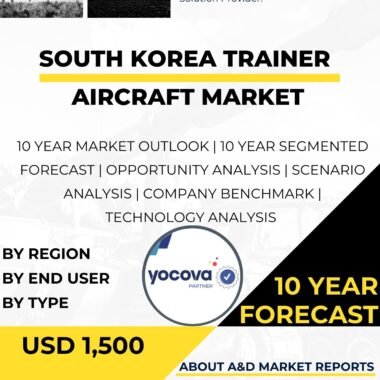Description
Brazil’s Embraer T-27 Tucano Modernization and Trainer Aircraft Development
Brazil trainer aircraft market is significantly advanced by Embraer’s efforts to modernize the T-27 Tucano and develop new training platforms, supporting the Brazilian Air Force (FAB) in building a skilled pilot force. This initiative enhances training efficiency, fosters technological self-reliance, and strengthens Brazil’s aerospace industry through local production and potential exports.
T-27 Tucano Modernization Program
The FAB’s fleet of 100+ T-27 Tucano aircraft, in service since 1983, is undergoing a comprehensive upgrade to extend operational life through 2030. Upgrades include modernized avionics, glass cockpits with multifunction displays, and enhanced Pratt & Whitney PT6A-25C turboprop engines (750 shp), improving fuel efficiency and performance for basic and intermediate flight training. Conducted at Embraer’s Gavião Peixoto facility, the program ensures the Tucano remains a cost-effective platform for teaching maneuvers, navigation, and formation flying, preparing pilots for advanced aircraft like the F-39 Gripen.
Indigenous Development and A-29 Super Tucano
Embraer’s A-29 Super Tucano, an evolution of the T-27, serves as an advanced trainer and light attack aircraft, powered by a Pratt & Whitney PT6A-68C engine (1,600 shp). With 133 units in FAB service, its advanced avionics, HUD, and weapons integration simulate combat scenarios, bridging basic training to operational fighters. Local production at Gavião Peixoto, with 80% indigenous content, supports Brazil’s self-reliance goals, creating over 1,000 jobs and fostering technology transfers for avionics and engine maintenance.
Applications Across Training Phases
The Tucano and Super Tucano support FAB’s phased training pipeline at the Air Force Academy (AFA) in Pirassununga. The T-27 handles initial flight training, focusing on basic aerobatics and instrument skills, while the A-29 introduces advanced tactics, including simulated air-to-ground missions and night operations. These platforms ensure pilots are combat-ready for missions like air defense and reconnaissance, with interoperability tested in exercises like CRUZEX.
Export Potential and Regional Influence
Embraer’s trainer aircraft, particularly the A-29, have secured export contracts with countries like Colombia and Chile, with over 200 units sold globally. The Super Tucano’s affordability and versatility position Brazil as a leader in the Latin American trainer market, In summary, Embraer’s T-27 and A-29 programs drive Brazil’s trainer aircraft market by delivering modernized platforms that ensure pilot readiness and support self-reliance. These efforts strengthen FAB’s capabilities, foster industrial growth, and position Brazil as a key player in regional aerospace training solutions.




